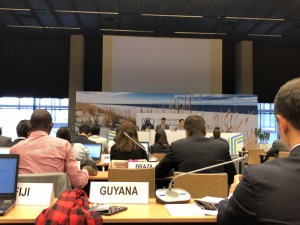
Despite warnings that the side events at COP24 tend to be more interesting than most of the actual negotiations, my decision this morning was to attend both an informal and a formal negotiation meeting. The first negotiations meeting I attended was an informal conversation with the SBSTA (Subsidiary Body for Scientific and Technological Advice) about the timeline countries should have to implement the rule book for carrying out the Paris Agreement. They were discussing whether countries should have 5 years, 10 years, or the ability to decide their own timeline.
I definitely see why people say the meetings can be difficult to sit through. There was a lot of jargon and sometimes tedious arguments that seemed a little trivial if you weren’t part of the United Nations (EX: one delegate from a country spoke about a small phrase in paragraph 5 of Article 4 that needed to be deleted.)
Still, I am so happy I spent time this morning orienting myself with a negotiations meeting. It was SO interesting to watch how a United Nations meeting works in practice. Basically, countries take turns raising placards with their country’s name on it when they want to speak.
Most countries seemed to support implementing a 5 year timeline for the Paris Rule book. The Marshall Islands and South Africa advocated strongly for this. But, the timeline decision is more complicated than it sounds because no one is sure when the 5 year deadline should be implemented, especially since there is no rule book yet. The informal meeting was more of a discussion with countries raising their arguments and voting to see what is agreed upon, but no official policies were adopted.
Afterward, I contrasted the informal meeting with a formal negotiations meeting about climate finance. As Chris mentioned in his post, it was interesting to watch South Africa get pretty heated. The formal negotiations meeting was a lot more structured, had more strictly imposed time limits, and seemed a lot more tense than the informal negotiations session. I wonder how the atmosphere in both informal and formal negotiations will change on certain issues, especially as sessions progress and the stakes become higher throughout the next two weeks.
Thanks for this, Brittni. I don’t see Chris’s comment about South Africa getting heated–but it’s interesting to think about negotiating styles and their impact. From what I’ve heard elsewhere, South African has had quite an impact on various elements of the climate regime–usually as a kind of blocking agent. I understand, for instance, that South Africa was one party blocking forward motion on the Green Climate Fund over the summer. Because each party has veto power (within the bounds of social pressure), and because there’s a lot at stake, I can imagine the formal negotiations being tense indeed. I’d love to hear more about the impact of these negotiation styles–and what the different terminological debates. What was the phrase that needed to be deleted, for instance?